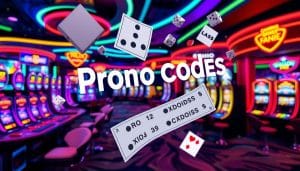Venturing into the world of cryptocurrency casinos can seem like stepping into a futuristic landscape of gaming. But before you dive in, it’s crucial to understand the licensing requirements that govern these digital establishments. With the surge in popularity of cryptocurrencies, the regulatory framework is constantly evolving, and staying informed is key to navigating this space successfully.
In this article, you’ll uncover the essential licensing protocols that cryptocurrency casinos must adhere to. Whether you’re a potential operator or a curious player, knowing these rules ensures that you’re part of a safe and legal gaming environment. Let’s peel back the layers of regulation that make the foundation of a trustworthy crypto casino.
Table of Contents
ToggleWhy Are Licensing Requirements Important for Cryptocurrency Casinos?
When engaging in the digital space, particularly with cryptocurrency casinos, you’ll realize licensing plays a critical role in establishing credibility. Trust is a fundamental aspect of any gaming operation, and licenses are a testament to a casino’s adherence to industry standards and legal requirements. By obtaining a license, a cryptocurrency casino not only validates its legitimacy but also offers you peace of mind, knowing that the platform is subject to regulatory oversight.
A licensed cryptocurrency casino ensures that fair play is paramount. With regulations in place, these casinos are obligated to use provably fair algorithms, which allow you to verify the fairness of each game round independently. This transparency is crucial in a market where digital transactions can be complex and difficult to audit. Moreover, licensed platforms are more likely to implement robust security measures to protect your funds and personal information from potential cyber threats.
The presence of licensing requirements also indicates a level of protection for operators against legal risks. In the event of disputes or issues, a licensed cryptocurrency casino has a framework to fall back on, offering resolution mechanisms that protect both you, the player, and the casino itself. This includes access to support services and arbitration processes which can be incredibly valuable in the dynamic and often unpredictable world of online gaming.
Furthermore, licensed casinos are generally obliged to support responsible gaming initiatives. They provide tools and resources to prevent problem gambling, ensuring a healthier gaming environment. As the cryptocurrency casino segment continues to thrive globally, understanding the importance of licensing can guide you in choosing platforms that are both enjoyable and secure.
Bullet Points:
- Licenses establish trust and legitimacy.
- Ensure fair play through provably fair algorithms.
- Enhance security measures to protect players.
- Provide a legal framework for dispute resolution.
- Support responsible gaming initiatives.
The Evolution of Cryptocurrency Casino Licensing
Cryptocurrency casinos have come a long way since their inception. In the early days, such platforms operated in a nebulous legal area, with little to no oversight. As digital currencies gained prominence, regulators stepped in to address the legal vacuum. Licensing regimes began to take shape, adapting traditional gambling frameworks to the digital age.
Initial Licensing Attempts
Initial licensing efforts were fragmented, with casinos seeking permits from jurisdictions with lax oversight. Often, these early licenses provided little assurance of fairness or security. As the potential risks became more apparent, reputable jurisdictions recognized the need for more stringent regulations.
Shifting to Stringent Regulations
Forward-thinking regulators in territories like Malta and the Isle of Man developed licenses specifically for cryptocurrency casinos. These guidelines set higher standards for operational excellence, security, and consumer protection.
| Jurisdiction | License Attributes |
|---|---|
| Malta | Comprehensive regulatory framework |
| Isle of Man | Requirements for financial transparency |
The implementation of such licenses meant that cryptocurrency casinos had to adopt robust security measures and responsible gaming policies. These efforts reassured players about the integrity of the games and the protection of their funds.
With the growth of blockchain technology, authorities have started exploring ways to leverage it for licensing purposes. The idea is simple but revolutionary: use blockchain to ensure transparency and prove compliance in real-time. This emerging trend signifies the next step in licensing, where trust is built not only through regulations but also through technology.
As you navigate the evolving landscape of cryptocurrency casinos, it’s vital to stay informed about these licensing changes. They’re not just legal formalities. They’re the pillars that support the safer gaming environment you deserve.
Understanding Regulatory Bodies in the Crypto Casino Industry
As you delve deeper into the world of cryptocurrency casinos, it’s vital to understand the role of regulatory bodies in the industry. Crypto casinos once operated on the fringes, but regulatory oversight has become increasingly paramount as these platforms proliferate. Different jurisdictions have taken varied approaches to regulation, and being aware of these can help you navigate the complex landscape.
Malta Gaming Authority (MGA) and the UK Gambling Commission were among the first to introduce crypto-specific guidelines. These bodies ensure that casinos meet stringent standards of fairness and customer protection. Operators licensed under these jurisdictions are required to demonstrate that they can protect players’ funds, maintain operational integrity, and prevent fraudulent activities.
In contrast, some regulatory bodies, such as Curacao eGaming, offer a more streamlined licensing process, which has been attractive for new entities in the crypto casino space. However, the level of oversight can be less rigorous compared to the likes of MGA. This doesn’t mean they’re unsafe, but you should be aware that the standards may differ.
Emerging in the space are regulatory initiatives like the Isle of Man Gambling Supervision Commission, which has pioneered a blockchain-integrated license. This aligns with the core philosophy of blockchain technology—distributed trust and transparency. The commission’s framework is designed to offer real-time monitoring of transactions and operations, raising the bar for what’s expected in terms of compliance.
When choosing a crypto casino, it’s recommended to look at the regulatory body governing its operations. Licensing information is usually prominently displayed on the website, often in the footer. You’ll want to ensure the casino you’re interested in is accountable to a reputable authority.
- MGA and UK Gambling Commission: Rigorous standards and oversight
- Curacao eGaming: More accessible but potentially less oversight
- Isle of Man Supervision Commission: Innovative blockchain-integrated licensing
Understanding the intricacies of these regulatory bodies can help you make informed decisions and engage with platforms that are not just legally compliant, but also prioritize your security and fair play.
Common Licensing Requirements for Cryptocurrency Casinos
When you’re exploring the world of cryptocurrency casinos, it’s critical to understand the licensing requirements these platforms must adhere to. While each jurisdiction may have specific mandates, certain commonalities span across most regulatory frameworks. These standard requirements ensure the integrity and safety of online gambling environments while also protecting you, the user.
Due Diligence and Background Checks: Operators must pass thorough background checks to prove their credibility. This involves a review of the owners’ financial and criminal histories, ensuring that those behind the scenes are trustworthy and capable of running a fair operation.
Software Audits: To guarantee that games are fair and operate correctly, third-party agencies conduct software audits. Random Number Generators (RNGs) must be verified for true randomness, confirming the unpredictability of game outcomes. A certificate from a reputable auditing firm often accompanies this step.
Anti-Money Laundering Protocols: Cryptocurrency casinos are required to have stringent Anti-Money Laundering (AML) measures in place. This means implementing Know Your Customer (KYC) processes to verify the identity of users and monitor suspicious transactions.
Consumer Protection Policies: Regulatory bodies demand robust policies that safeguard players’ funds and personal information. Detailed terms of service, including dispute resolution processes and responsible gambling measures, must be clearly articulated and adhered to.
Operational Infrastructure: Operators should have a solid operational foundation, comprising secure servers, encrypted communications, and reliable customer support. This infrastructure supports a secure gaming environment and ensures user issues are promptly addressed.
Here’s a breakdown of operational infrastructure components:
- Secure servers
- Encrypted communications
- Reliable customer support
Understanding these requirements gives you a clearer picture of what to look for when selecting a crypto casino. It’s about more than the games on offer; it’s also about how well the platform protects you and your funds. Always check whether these protocols are in place and transparently communicated before engaging in any online gambling activity.
Ensuring Safety and Fairness: Compliance Standards for Crypto Casinos
When you’re navigating the maze of cryptocurrency casinos, you’ll notice that compliance standards are set up as the backbone of a trustworthy platform. These compliance standards aren’t just a series of hoops for operators to jump through; they safeguard your interests and uphold the fairness and integrity of the games.
At the core of these standards are Random Number Generations (RNG) audits. You’re probably aware that RNGs ensure each spin of the reels and deal of the cards is purely random. But did you know that independent bodies conduct rigorous testing of these systems? They provide certifications to casinos that meet the criteria, giving you peace of mind that each game is as random and fair as it’s supposed to be.
Alongside RNG certifications, payout rates of the games are another critical area. Verified casinos display their payout percentages, allowing you to understand the potential return on your wagers. High payout rates generally mean better odds for you.
Also, crypto casinos are required to implement robust anti-fraud and security measures. Here’s what this includes:
- Secure Socket Layer (SSL) encryption
- Two-factor authentication (2FA)
- Cold storage of digital assets
These measures are non-negotiable for any reputable crypto casino that wants to guarantee the security of its platform and the protection of your funds.
Licensing authorities also demand strong Responsible Gambling policies. Casinos must offer tools and support to help you manage your gambling activities, which often include:
- Self-exclusion options
- Loss limits
- Reality checks
While selecting a cryptocurrency casino, you’ll want to check for clear and accessible information outlining all these compliance measures. Platforms that are transparent about their adherence to these standards are signaling their commitment to providing a safe gaming experience. Remember, in a sector where digital footprints are permanent and traceability can be opaque, the importance of these compliance measures in ensuring a secure and fair gambling environment cannot be overstated.
Conclusion
Understanding the licensing requirements for cryptocurrency casinos is crucial for both operators and players. It’s about protecting your interests and ensuring a fair playing field. Adhering to strict compliance standards isn’t just a legal formality; it’s a commitment to the integrity of online gambling. As you navigate this evolving landscape, remember that the security measures and responsible gambling policies in place are there for your benefit. Trust in these protocols allows you to engage with confidence, knowing that the thrill of the game won’t come at the cost of fairness or safety.
Frequently Asked Questions
What is the main purpose of compliance standards in cryptocurrency casinos?
Compliance standards in cryptocurrency casinos are designed to ensure safety and fairness for users, contributing to a secure and trustworthy gambling environment.
How do Random Number Generation (RNG) audits contribute to fairness?
RNG audits verify that the games’ outcomes are truly random, ensuring that the games are fair and not manipulated in favor of the house or players.
Why are payout rates significant in crypto casinos?
Payout rates indicate the average percentage of money returned to players over time. High payout rates reflect a casino’s fairness and its tendency to favor the player’s chances of winning.
What roles do anti-fraud and security measures play in crypto casinos?
Anti-fraud measures and security protocols, such as SSL encryption and two-factor authentication, help protect user data and prevent unauthorized access, enhancing the overall integrity of the casino.
How do responsible gambling policies benefit players?
Responsible gambling policies are designed to protect players from the potential harms of gambling addiction by providing tools and resources to help manage their gambling habits responsibly.
Why is transparency in outlining compliance measures important?
Transparency is crucial because it allows users to understand the measures a casino takes to ensure safety and fairness, building trust between the player and the platform.





















